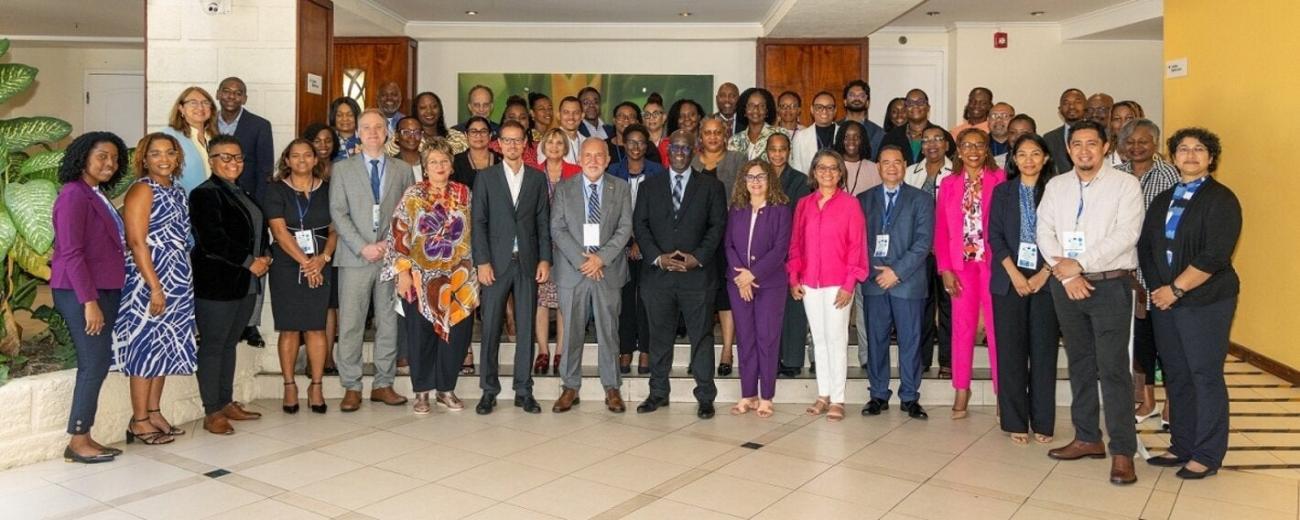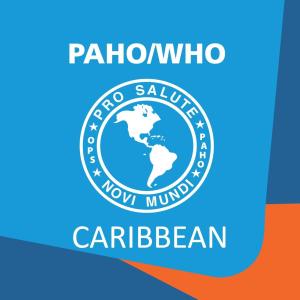Bridgetown, Barbados, 25 June 2025 (PAHO/WHO) – From 17-19 June, representatives from the Ministries of Health and Environment, CARICOM and its agencies and other key stakeholders met in Barbados to discuss the proposed new Caribbean Action Plan on Health and Climate Change. During the meeting convened by the Pan American Health Organization (PAHO), regional and global experts assessed the progress of climate change and health in the Caribbean, shared experiences, strengthened networks and developed strategies to further enhance climate resilient health systems.
During the meeting, stakeholders reviewed the first Caribbean Action Plan on Health and Climate Change (2019-2024), provided valuable insights to the development of the new plan, discussed youth empowerment, the gaps, challenges and opportunities for research, implementation and financing of climate and health actions, among other topics. It is hoped that the new Caribbean Action Plan on Climate Change and Health will be presented to the regional community at COP30 on Health Day, 13 November 2025, as part of the Caribbean’s contribution to the global climate and health dialogue.
Mr. Wayne Marshall, Permanent Secretary, Ministry of Health and Wellness, Barbados commended the PAHO/WHO for its support to Barbados and the wider region and described the meeting as key to amplifying our voices so that health has a stronger presence in climate discussions, both locally and on the global stage. “The threats to public health posed by rising temperatures, extreme weather events, vector-borne diseases, food and water insecurity, and the disruption of health services are not isolated incidents. They are shared regional realities that demand shared solutions,” he said.
PAHO/WHO Representative for Barbados and the Eastern Caribbean Countries, Dr Amalia Del Riego, pointed out that the first plan stands as a milestone in sub-regional cooperation.
“As we meet today, we build on that strong foundation. This gathering is both a reflection of past progress and a call to action for what lies ahead. We must ensure that health is no longer peripheral, but central to climate adaptation, financing and resilience building efforts across the region,” she asserted.
Interim Director of the PAHO Caribbean Subregional Program Coordination Office, Dr Juan Manuel Sotelo, underlined that over the past five years the Caribbean had laid a strong foundation through key regional initiatives, backed by the European Union (EU) and the Green Climate Fund. These include the development of Health National Adaptation Plans, Early Warning Systems for Dengue, the rolling out of health co-benefit tools and improved national capacities for climate-informed surveillance. Seven CARICOM countries are also working to strengthen intersectoral coordination through the establishment of national climate and health committees, conduct needs assessments and carbon footprint assessments in healthcare facilities in Belize, Guyana, Jamaica and Saint Lucia.
Despite the difficult geopolitical times, Dr. Maria Neira, Director of Public Health, Environment and Social Determinants of Health at the World Health Organization, highlighted that the reality remains unchanged.
“Being among the most vulnerable gives you the possibility of being among those who have more experience, more impetus to do something, because you realize how important it is. And that is why we need you in this part of the world as a champion on understanding how to respond to the challenges of climate change to protect our health, how to argue for more action on adaptation to climate change,” Dr Neira explained.
Mr. Luca Trinchieri, Team Leader, Green Deal, EU Delegation to Barbados, Eastern Caribbean, OECS and CARICOM/CARIFORUM, European Commission, described efforts in the Caribbean as well aligned with the EU Global Gateway Agenda. “It is essentially about unlocking long-term, inclusive development, and putting people’s well-being, including health at the heart of our partnership. But, as you know too well, the path to resilience is not a single project, it is not a 5-year Plan, it is a long-term transformation, one that requires sustained leadership, inclusive governance, community ownership and predictable financing,” he remarked.
While noting that the Caribbean stood at a crossroads, Ms Alison Drayton, Assistant Director General, CARICOM, underlined that collective leadership and strategic collaboration were critical to forging strengthened systems, innovative solutions and sustainable pathways to safeguard health outcomes in a rapidly changing global environment.
.............................................................................................................
This story was first published by PAHO.





